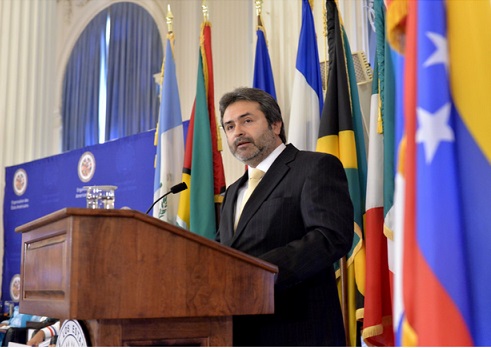
09:57.
Washington, Jun. 18. The United Nations Climate Change Conference, COP20, scheduled for December in Lima, aims to lay the groundwork for an agreement to make a qualitative leap in global negotiations to curb global warming, said Peru’s Permanent Representative to the OAS Juan Jimenez.
During the 59th Policy Roundtable of the Organization of American States (OAS), held on Tuesday at the headquarters of the hemispheric Organization in Washington, DC, Jimenez also mentioned that such a process should culminate in the meeting to be held in Paris in 2015.
The government official said “the aim of the Lima meeting will be to serve as a prelude to the Paris meeting, where countries will sign a new protocol leaving behind the Kyoto Protocol,” the only such internationally binding document on the issue.
In this area, he concluded, Peru and France are joining achieve support for the new protocol.
The policy Roundtable had as its central theme “Policy Dialogue on Climate Change: Challenges and Opportunities for the Americas.”
Executive Vice President Ramírez Tejada endorsed the words of the Secretary General of the United Nations, Ban Ki-Moon, who said that climate change “is the great challenge of the 21st Century.”
He stressed that, in the specific case of the Americas, it is even more urgent to work to reduce the production of gases in the transport and energy sectors.
In his introduction of the topic, Hugo de Zela, Chief of Staff of the Secretary General of the OAS, José Miguel Insulza, said that faced with the increase of the consequences of climate change on the planet and the region, it is essential to adopt policies on the issue.
“The issue of climate change has ceased to be a debate, and is an issue that involves governance and public administration, and therefore involves all of us,” said Ambassador De Zela, who spoke on behalf of the leader of the Organization.
The Chief of Staff of the Secretary General of the OAS highlighted that while the effects of climate change affect everyone without distinction, “the poor are the most affected.”
“You have to keep in mind that climate change will generate conflicts of all kinds and especially cause problems of equity in access to resources,” he said.
The ambassador recalled that in the recent OAS General Assembly, held in Paraguay, member states adopted the Declaration of Asuncion, where they resolved “to continue and strengthen our efforts to advance the implementation of the commitments on sustainable development and climate change, to counter the adverse effects of climate change.”
This article was originally published in the Peruvian News Agency (Andina), here.
Photos: OAS


 View Map
View Map